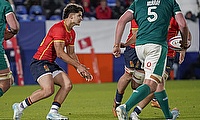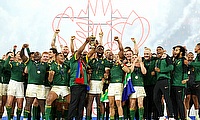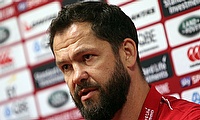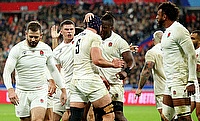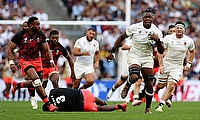Need new glasses Ref?
Rugby Union is, as the old saying goes, a Thug's game played by Gentlemen. As such, it requires law and discipline to control the high tempo, aggressive nature of the game in order to keep the players in line. This duty falls directly to the referee, who demands absolute control on the rugby pitch. If a player steps out of line, he gets sin-binned for ten minutes to cool off, and rightly so. If he throws a punch, or abuses the referee in any way he gets a red card, and is sent off indefinitely. This is vital to ensure that the referee is in full control of the game, not only for the enjoyment of spectators, but for the player's safety through fear of reprimand for dangerous or illegal play. I have utmost respect for the referees in rugby union, but recently things have started to change.
A pattern of poor refereeing and horrendous decisions has begun to emerge in the professional game over the last few years. If one remembers back to the 2007 World Cup Final, you may remember the questionable penalties that were given against England allowing Percy Montgomery to kick South Africa to victory. Similarly, you may remember Toby Flood pushing Montgomery into a camera, despite his lack of possession of the ball, and completely getting away with it. Everybody has bad days at the office, and we treated this one as such.
So why is the game being marred now with seemingly ridiculous decisions and poor refereeing from club level right up to the International stage? I refer to the Ireland V Wales game in the 2011 RBS Six Nations, in which Wales scrum-half Mike Phillips scored a completely illegal try. Ireland's replacement fly-half Jonny Sexton executed a poor kick to touch, in which the ball was sent into the watching crowd. A ball-boy then handed Matthew Rees a different ball, which he threw to Phillips, catching Ireland asleep and enabling him to score the try that won them the game. As any purveyor of Rugby union knows, in order to take a quick line-out throw, the ball cannot be touched by anybody else before the player picks it up, and most definitely has to be the same ball. The touch-judge of the day, Peter Allan, informed referee Jonathan Kaplan that it was a perfectly legal throw, despite the video evidence that tells us otherwise. Rugby Union is a game that allows the use of Television Match Officials, or TMOs, to view an incident again from recorded footage during the match to decide whether foul play has been committed. Why wasn't it used on this occasion? Not only did this poor decision cost Ireland the match, and subsequently their chance of winning the title, it threw into doubt the ability of refereeing at International Level.
Premiership rugby is also suffering from poor decision making from the match officials. Recently, Leeds Carnegie played Harlequins, and were at the wrong end of some ridiculous decisions. At one point, Harlequins were rewarded a penalty for the offence of Leeds crossing, where a player without the ball obstructs a defender by blocking the ball carrier, thus preventing the tackle being made. This decision was made against Leeds, despite them being the defending team at the time. In other words, crossing was an impossible offence for them to commit at the time of not having possession of the ball. This penalty decision led to a try scoring opportunity for Harlequins. A hugely contested issue in Rugby Union at the moment is the refereeing of the scrum, and at the breakdown of a ruck. When the whistle blows following an infringement at the scrum or the breakdown, it is anybody's guess as to who will be awarded the penalty. After the match against Quins, Leeds coach Neil Back said 'at the contact area which is a mess in world rugby at the minute, it's a nightmare to referee and people are getting away with murder' (speaking on BBC Radio Leeds, West Yorkshire Sport, 24/04/2011). Other clubs have also been subject to poor decision making, such as Northampton Saints flanker Callum Clark's unfair sin-binning following a perfectly legal, if not brilliantly executed charge down tackle of Newcastle fly-half Jimmy Gopperth. During Clark's absence from the pitch, Newcastle were able to pull back to within seven points of Saints, ensuring their much needed losing bonus point to pull them out of the relegation zone. This shows that decisions wrongly made by referees is having a real impact on the way teams are able to win matches or bonus points, and is unfairly ruling the way the league table is decided.
What then can be done to ensure an easier job for referees to notice foul play or infringements correctly at the breakdown and in open play? For one thing, I strongly believe that the TMO should be used more openly, and should be allowed input into the decision making rather than answering only specific questions asked by the referee. Touch judges are allowed to speak to the referee if they notice an offence, and so should TMOs. They are available so why not use them? The scrum is being widely debated around the world, and this is an area in which it is unlikely a fully accepted solution will ever be created. One thing that can be done to ensure that a prop forward is binding properly, or the ball is being fed straight is to make more use of the touch judges either side of the scrum. The referee cannot see both sides at once, and so players are often wrongly accused of an offence they have not committed. Finally, referees need to be completely impartial, as they often seem to penalise the teams they expect to do poorly, or players who have a reputation of committing offences (such as Callum Clark, or Leeds Carnegie). Whatever is done, things need to change to make the fantastic sport of Rugby fairer, faster, and most importantly enjoyable for everyone.
